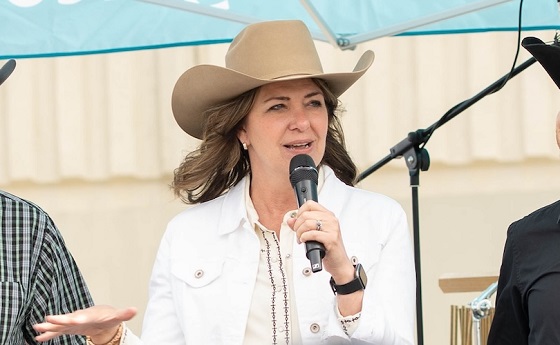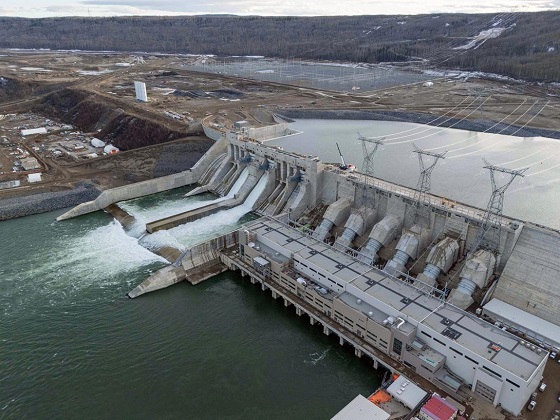Alberta
Alberta announces shut down of indoor sporting events, 11 pm closure of bars and restaurants, no social gatherings for 2 weeks
From the Province of Alberta
New measures to curb the rapid growth of COVID-19
Targeted health measures will take effect on Nov. 13 to curb the rapid growth of COVID-19 in Alberta and protect the health system.
Alberta’s government is implementing additional health measures to help protect hospitals, keep schools and businesses open, and protect vulnerable Albertans.
There are 8,305 active cases of COVID-19 in the province. Hospitalizations and intensive care unit admissions are at their highest point since the pandemic began.
New public health measures
Starting Nov. 13, all restaurants, bars, lounges and pubs in regions under enhanced status must cease liquor sales by 10 p.m. and close by 11 p.m. The restriction will remain in place until Nov. 27.
There will also be a two-week ban on indoor group fitness classes, team sport activities and group performance activities in Edmonton and surrounding areas, Calgary and surrounding areas, Grande Prairie, Fort McMurray, Red Deer and Lethbridge.
Additional public health measures will also be implemented in all regions under an enhanced status. These measures will be in place until further notice:
- Maximum attendance of 50 at wedding or funeral ceremonies.
- It is recommended all faith-based activities limit attendance to one-third capacity per service.
- Residents should not hold social gatherings within their homes and should not plan social gatherings outside their community.
- It is recommended employers in office settings implement measures to reduce the number of employees in the workplace at one time.
All existing guidance and legal orders remain in place in all areas.
Alberta Health, AHS and local municipalities will continue to closely monitor the spread across the province.
The Government of Alberta is asking all Albertans to do their part. If these measures are not successful, it will be necessary to implement more restrictive measures.
“We must take action at this critical point to contain the rapid growth of COVID-19 in our province. Through our actions, we can support the health-care system, keep schools open, protect vulnerable Albertans and keep the economy operating throughout the province. This is our chance. If Albertans respond to these and other public health guidelines now, we won’t need more restrictive measures in the future.”
“We must reduce the spread of COVID-19. In addition to these measures, I am asking all Albertans to look at our lives and reduce our social and close contact interactions wherever we can. If we can connect virtually or through other means, we need to make that change. By working together, we can protect each other, reduce the spread and protect our health system.”
Quick facts
- There are 8,305 active cases and 27,707 recovered cases in Alberta.
- There are 225 people in hospital due to COVID-19, including 51 in intensive care.
- The total number of COVID-19 deaths is 393.
Alberta
Danielle Smith slams Skate Canada for stopping events in Alberta over ban on men in women’s sports

From LifeSiteNews
The Alberta premier has denounced Skate Canada as ‘disgraceful’ for refusing to host events in the province because of a ban on ‘transgender’ men in women’s sports.
Alberta Premier Danielle Smith has demanded an apology after Skate Canada refused to continue holding events in Alberta.
In a December 16 post on X, Smith denounced Skate Canada’s recent decision to stop holding competitions in Alberta due to a provincial law keeping gender-confused men from competing in women’s sports.
“Women and girls have the right to play competitive sports in a safe and fair environment against other biological females,” Smith declared. “This view is held by a vast majority of Albertans and Canadians. It is also common sense and common decency.”
Women and girls have the right to play competitive sports in a safe and fair environment against other biological females.
This view is held by a vast majority of Albertans and Canadians. It is also common sense and common decency.
Skate Canada‘s refusal to hold events in… pic.twitter.com/n4vbkTx6B0
— Danielle Smith (@ABDanielleSmith) December 16, 2025
“Skate Canada‘s refusal to hold events in Alberta because we choose to protect women and girls in sport is disgraceful,” she declared.
“We expect they will apologize and adjust their policies once they realize they are not only compromising the fairness and safety of their athletes, but are also offside with the international community, including the International Olympic Committee, which is moving in the same direction as Alberta,” Smith continued.
Earlier this week, Skate Canada announced their decision in a statement to CBC News, saying, “Following a careful assessment of Alberta’s Fairness and Safety in Sport Act, Skate Canada has determined that we are unable to host events in the province while maintaining our national standards for safe and inclusive sport.”
Under Alberta’s Fairness and Safety in Sport Act, passed last December, biological men who claim to be women are prevented from competing in women’s sports.
Notably, Skate Canada’s statement failed to address safety and fairness concerns for women who are forced to compete against stronger, and sometimes violent, male competitors who claim to be women.
Under their 2023 policy, Skate Canada states “skaters in domestic events sanctioned by Skate Canada who identify as trans are able to participate in the gender category in which they identify.”
While Skate Canada maintains that gender-confused men should compete against women, the International Olympic Committee is reportedly moving to ban gender-confused men from women’s Olympic sports.
The move comes after studies have repeatedly revealed what almost everyone already knew was true, namely that males have a considerable innate advantage over women in athletics.
Indeed, a recent study published in Sports Medicine found that a year of “transgender” hormone drugs results in “very modest changes” in the inherent strength advantages of men.
Additionally, male athletes competing in women’s sports are known to be violent, especially toward female athletes who oppose their dominance in women’s sports.
Last August, Albertan male powerlifter “Anne” Andres was suspended for six months after a slew of death threats and harassments against his female competitors.
In February, Andres ranted about why men should be able to compete in women’s competitions, calling for “the Ontario lifter” who opposes this, apparently referring to powerlifter April Hutchinson, to “die painfully.”
Interestingly, while Andres was suspended for six months for issuing death threats, Hutchinson was suspended for two years after publicly condemning him for stealing victories from women and then mocking his female competitors on social media. Her suspension was later reduced to a year.
Alberta
Alberta’s huge oil sands reserves dwarf U.S. shale

From the Canadian Energy Centre
By Will Gibson
Oil sands could maintain current production rates for more than 140 years
Investor interest in Canadian oil producers, primarily in the Alberta oil sands, has picked up, and not only because of expanded export capacity from the Trans Mountain pipeline.
Enverus Intelligence Research says the real draw — and a major factor behind oil sands equities outperforming U.S. peers by about 40 per cent since January 2024 — is the resource Trans Mountain helps unlock.
Alberta’s oil sands contain 167 billion barrels of reserves, nearly four times the volume in the United States.
Today’s oil sands operators hold more than twice the available high-quality resources compared to U.S. shale producers, Enverus reports.
“It’s a huge number — 167 billion barrels — when Alberta only produces about three million barrels a day right now,” said Mike Verney, executive vice-president at McDaniel & Associates, which earlier this year updated the province’s oil and gas reserves on behalf of the Alberta Energy Regulator.
Already fourth in the world, the assessment found Alberta’s oil reserves increased by seven billion barrels.
Verney said the rise in reserves despite record production is in part a result of improved processes and technology.
“Oil sands companies can produce for decades at the same economic threshold as they do today. That’s a great place to be,” said Michael Berger, a senior analyst with Enverus.
BMO Capital Markets estimates that Alberta’s oil sands reserves could maintain current production rates for more than 140 years.
The long-term picture looks different south of the border.
The U.S. Energy Information Administration projects that American production will peak before 2030 and enter a long period of decline.
Having a lasting stable source of supply is important as world oil demand is expected to remain strong for decades to come.
This is particularly true in Asia, the target market for oil exports off Canada’s West Coast.
The International Energy Agency (IEA) projects oil demand in the Asia-Pacific region will go from 35 million barrels per day in 2024 to 41 million barrels per day in 2050.
The growing appeal of Alberta oil in Asian markets shows up not only in expanded Trans Mountain shipments, but also in Canadian crude being “re-exported” from U.S. Gulf Coast terminals.
According to RBN Energy, Asian buyers – primarily in China – are now the main non-U.S. buyers from Trans Mountain, while India dominates purchases of re-exports from the U.S. Gulf Coast. .
BMO said the oil sands offers advantages both in steady supply and lower overall environmental impacts.
“Not only is the resulting stability ideally suited to backfill anticipated declines in world oil supply, but the long-term physical footprint may also be meaningfully lower given large-scale concentrated emissions, high water recycling rates and low well declines,” BMO analysts said.
-

 Digital ID2 days ago
Digital ID2 days agoCanada releases new digital ID app for personal documents despite privacy concerns
-

 Bruce Dowbiggin2 days ago
Bruce Dowbiggin2 days agoNFL Ice Bowls Turn Down The Thermostat on Climate Change Hysteria
-

 Community1 day ago
Community1 day agoCharitable giving on the decline in Canada
-

 Energy2 days ago
Energy2 days agoCanada’s sudden rediscovery of energy ambition has been greeted with a familiar charge: hypocrisy
-

 Energy2 days ago
Energy2 days agoCan we not be hysterical about AI and energy usage?
-

 Crime2 days ago
Crime2 days agoTrump designates fentanyl a ‘weapon of mass destruction’
-

 Energy2 days ago
Energy2 days agoEnergy security matters more than political rhetoric
-

 Alberta1 day ago
Alberta1 day agoCanada’s New Green Deal






